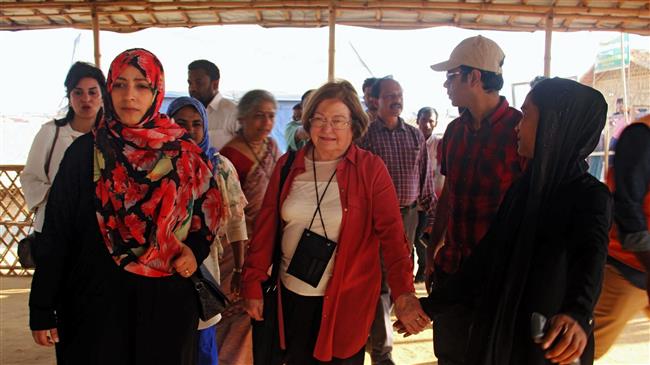UN has strong suspicion genocide has happened in Myanmar
The United Nations (UN)’s human rights chief has expressed strong suspicion that “acts of genocide” may have been carried out against Rohingya Muslims in Myanmar since August 2017.
Addressing the UN Human Rights Council on Wednesday, Zeid Ra’ad al-Hussein further said that reports about the bulldozing of sites in Myanmar pointed to a “deliberate attempt by the authorities to destroy evidence of potential international crimes, including possible crimes against humanity.”
“A recent announcement that seven soldiers and three police officers will be brought to justice for the alleged extra-judicial killing of ten Rohingya men is grossly insufficient,” he said.
Hundreds of thousands of Rohingya Muslims have fled Myanmar since its military launched a bloody campaign against them across the western Rakhine State in late 2016 and intensified it in August last year.
The refugees have settled at squalid camps in a region in Bangladesh known as Cox’s Bazar. There, they have been recounting the horrific violence they were exposed to back in Rakhine, which the government has blockaded.

According to the witness accounts, soldiers and Buddhist mobs have been murdering and raping the Rohingya, and torching their villages. Satellite imagery obtained by rights groups have shown entire villages bulldozed in what seems to be an attempt at destroying crime scenes.
The UN has formerly floated the idea that the atrocities constitute “ethnic cleansing.” On Tuesday, a UN official used that term definitively to describe the violence.
Bangladesh casts doubt about deal with Myanmar
Meanwhile, a senior Bangladeshi cabinet minister accused Myanmar of obstructing efforts to repatriate nearly 750,000 Rohingya Muslim refugees, saying that it was unlikely the displaced people would ever be able to return to their homeland.
Finance minister A.M.A Muhith said on Tuesday that a repatriation deal signed between Myanmar and Bangladesh in November last year would likely fail despite the Bangladeshi government’s official position that the refugees must eventually go back.
“I do not believe the Rohingya can be sent back,” he said. “You can speculate that very few will return to Burma (Myanmar). The first reason is that Burma will only take a few and secondly is that the refugees will never return if they fear persecution.”

Rights groups and the UN have warned that conditions for the return of the refugees are not in place.
The refugees living in camps in southeastern Bangladesh have also resisted the idea, fearing they will not be safe if they return to Rakhine.
An estimated 6,700 Rohingya Muslims were killed by security forces joined by Buddhist mobs in the first month of the crackdown alone, according to Doctors without Borders.
Yemeni army strikes Israeli military sites with drones
‘Clock ticking’: UNRWA slams unjustifiable killing of children in Gaza
BP to be sued in Britain for supplying oil to Israel
VIDEO | Press TV's news headlines
Israeli strikes on north Gaza hospital ‘extremely dangerous, terrifying’: Director
VIDEO | Yemen targets Tel Aviv with Palestine 2 missiles
Pezeshkian: Iran resolved to complete North-South Transport Corridor
VIDEO | Iran-Syria: For Resistance














 This makes it easy to access the Press TV website
This makes it easy to access the Press TV website